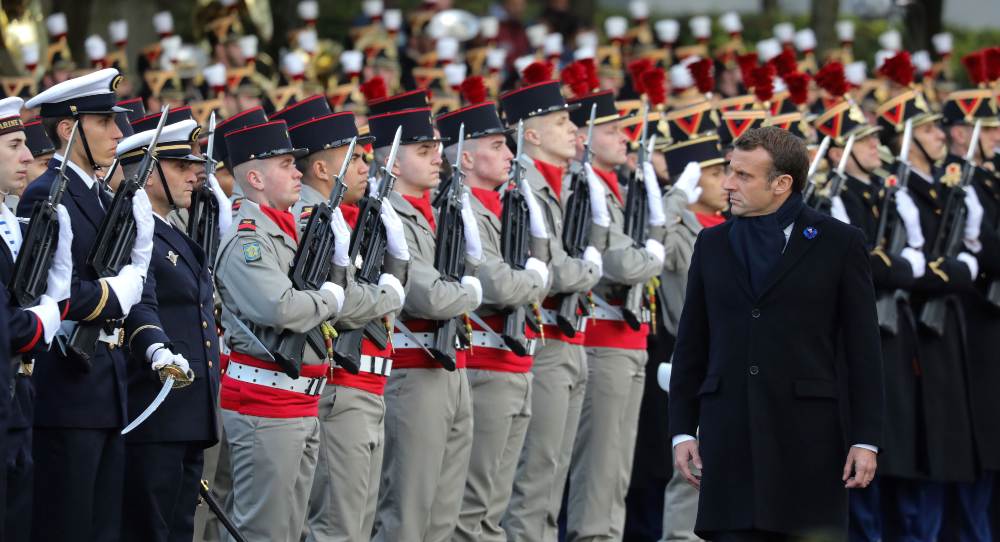Europeans have to decide. They can continue to bury their heads in the sand or start taking their security and defense seriously.
If they opt for the former, the EU will become an insignificant player in the region and further afield. If it opts for the latter, this means that EU leaders will have to become much more politically and economically integrated. Without that, the bloc can forget about developing a common strategic culture, let alone deal with the rise of China and continuing Russian influence in Europe.
That was French President Emmanuel Macron’s unadulterated analysis to the Economist on November 7. The interview was vintage Macron: outspoken, unapologetic, and trenchant. It coincided with celebrations in Berlin marking the thirtieth anniversary of the collapse of the Berlin Wall and the subsequent reunification of Germany.German politicians bent over backward to reaffirm their commitment to spend more on defense, to praise the United States’ role in making 1989 happen, and to strengthen the transatlantic relationship. Lots of reassuring words. But for Macron, today’s reality has to be confronted with deeds, and soon. That is what makes Europeans uncomfortable; they will have to make hard choices.
The first is to tackle NATO. In the interview, Macron called it “brain-dead.” How that upset several European countries. Poland and others rushed to NATO’s defense. Their fear is a Europe—led by France—that would weaken the bonds with NATO and the United States. Those bonds are already under strain, and not just because U.S. President Donald Trump has criticized the Europeans for free-riding and taking the American security guarantee for granted. His predecessor, former U.S. president Barack Obama, also criticized the Europeans, albeit more elegantly.
Macron’s blunt analysis of NATO was aimed at warning Europeans to be prepared. Assuming NATO continues—unless Trump sees it differently if he is reelected—there should be no reason for Europe not to start taking care of its own defense. It doesn’t need to be in competition with NATO. It couldn’t take on that role even if it wanted to; Europe lacks military capabilities and a shared strategic culture.
Yet precisely because of these deficits, Europe is vulnerable. The many supporters of NATO in the U.S. Congress should encourage Europe to develop viable and strong defense and security structures. Vulnerable allies are costly and exploitable.
To assume a stronger defense posture, Europe needs more political and economic integration. Macron has been calling for both ever since taking office in May 2017. And in a reference to the Western Balkans, he has argued that the EU cannot enlarge further until it has put its own house in order.
Macron’s views have won him few allies inside the EU. Poland and the Baltic states, but other member states as well, reject his proposals, whether about dealing with NATO, putting a brake on enlargement, resetting relations with Russia, or pushing the bloc toward more integration.
It’s all very well criticizing Macron for challenging the status quo. But what about EU leaders putting forward their own proposals for Europe? More importantly, where does Germany stand with regard to Europe’s direction and defending its interests?
During the thirtieth anniversary celebrations, there was no shortage of support for NATO and the United States in all the speeches given by German ministers and officials, especially after Macron’s broadside attack on NATO.
Heiko Maas, the German foreign minister who seemed to have forgotten America’s role in supporting Germany in 1989, suddenly waxed lyrical about NATO and the United States. Earlier, he had even suggested that Europe—meaning Germany—stay out of the trade dispute between Beijing and Washington, going so far as implying an equidistant stance between both, as if the dispute didn’t affect the global economy, and as if the United States was not Europe’s ally.
Yet, very slowly, a debate about German leadership is starting. It’s an awkward one because it means dealing with power, strategy, and influence. Annegret Kramp-Karrenbauer, the German defense minister and leader of the Christian Democrats (and Chancellor Angela Merkel’s preferred successor) gave a thoughtful speech at the Bundeswehr University in Munich.
Her message was that by invoking a “culture of restraint, we claim all sorts of considerations and constraints.” In plain language, Germany shirks its responsibility. “We have every reason to show more courage,” she said. Kramp-Karrenbauer even went further by suggesting that Germany help its allies in the Indo-Pacific region:
“Our partners in the Indo-Pacific region . . . feel increasingly encroached upon by China’s claim to power,” she said. “They would like to see a clear sign of solidarity, in support of applicable international law, inviolable territory, and free shipping routes. The time has come for Germany to give such a sign, to be present in the region together with our allies. Because it is in our interest that existing law be observed.”
Maybe this is one of the replies to Macron’s proposals. But it is one that falls short of answering his “how to do it.” Until then, Macron will remain alone and Europe remain vulnerable.










